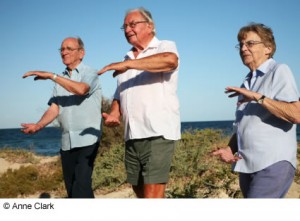 Simon Cowell may appear to relish arguing with his fellow judges when they disagree with him, but new research out today suggests that – at least at a neuronal level – he would find their agreement much more satisfying
Simon Cowell may appear to relish arguing with his fellow judges when they disagree with him, but new research out today suggests that – at least at a neuronal level – he would find their agreement much more satisfying
Researchers at the Wellcome Trust Centre for Neuroimaging at UCL (University College London) in collaboration with Aarhus University in Denmark have found that the ‘reward’ area of the brain is activated when people agree with our opinions. The study, published today in the journal ‘Current Biology’, suggests that scientists may be able to predict how much people can be influenced by the opinions of others on the basis of the level of activity in the reward area. [continue reading…]

-
Being outside in nature for just 20 minutes in a day was enough to significantly boost vitality levels, the research finds.
Feeling sluggish? The solution may require getting outside the box – that big brick-and-mortar box called a building.
Being outside in nature makes people feel more alive, finds a series of studies published in the June 2010 issue of the Journal of Environmental Psychology. And that sense of increased vitality exists above and beyond the energizing effects of physical activity and social interaction that are often associated with our forays into the natural world, the studies show.
“Nature is fuel for the soul, ” says Richard Ryan, lead author and a professor of psychology at the University of Rochester. “Often when we feel depleted we reach for a cup of coffee, but research suggests a better way to get energized is to connect with nature,” he says. [continue reading…]

Image:iStockphoto
ai Chi, a low impact martial art, has been associated with reduced stress, anxiety and depression, and enhanced mood, in both healthy people and those with chronic conditions. A systematic review of the subject, published in the open access journal
BMC Complementary and Alternative Medicine, found that although Tai Chi does appear to have positive psychological effects, more high quality, randomized trials are needed.
[continue reading…]
Published: August 9, 2009
Infusing more meaning and purpose into class lessons can help improve children’s outlook on life, curb depression and boost grades, University of Pennsylvania psychologist Martin E. P. Seligman, PhD, said at a convention plenary session.
Seligman shared several studies suggesting that positive education works. In one as-yet-unpublished study, for example, 240 ninth-graders were randomly assigned to a literature course with or without a positive psychology component. Those participating in the positive psychology group read all of the same novels as the control — classics such as “Romeo and Juliet” and “The Scarlet Letter” — but in addition to leading typical class discussions and making assignments, teachers also focused on promoting positive messages, through discussions on such topics as the strengths of the main characters. The students in this group were also assigned to do three loving things for another person. Researchers continued to follow these students throughout high school and found that those who had taken part in the positive psychology class improved their social skills and had a greater love of learning, as well as higher grades than those who did not participate in the positive psychology course. [continue reading…]
 Simon Cowell may appear to relish arguing with his fellow judges when they disagree with him, but new research out today suggests that – at least at a neuronal level – he would find their agreement much more satisfying
Simon Cowell may appear to relish arguing with his fellow judges when they disagree with him, but new research out today suggests that – at least at a neuronal level – he would find their agreement much more satisfying

